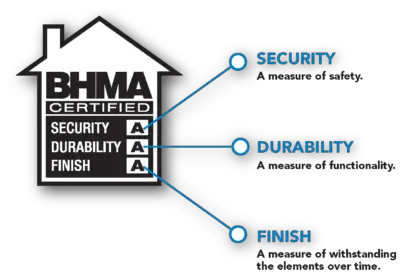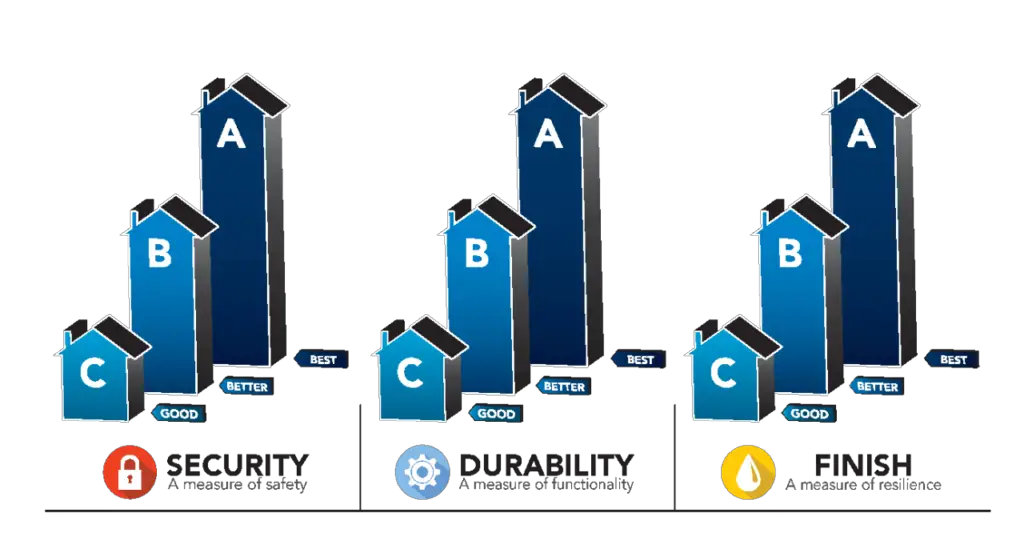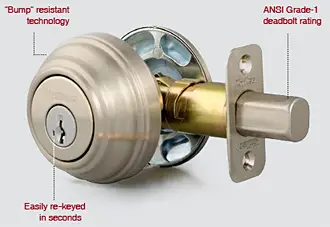Last Updated on May 21, 2024

BHMA Rating Definition | Security Rating | Durability Rating | Finish Rating | BHMA AAA vs ANSI Grade 1
BHMA vs ANSI Lock Grade Ratings
We wrote an article ANSI Lock Grades Explained previously, but there is another increasingly common door hardware grading system in use that is appearing on new products called the BHMA rating. What is it, and what does it mean for you?
A little background on the topic: ANSI is the American National Standards Institute, and it’s their job is to oversee the standards of all sorts of products, both for domestic and international use, being manufactured in the US today.
BHMA is the Builders Hardware Manufacturers Association, and they provide the testing standards that ANSI adopts in regard to door hardware.
The BHMA lock rating is a residential lock grading system. Its aim is to simplify lock grades so that consumers can better understand them. Unlike the ANSI lock grading system which has very specific use and durability requirements, the BHMA rating gives a simple letter grade to three separate components: Security, Durability, and Finish. The rating system assigns an A, B, or C grade for each component. C is good, B is better, and A is the best. The best BHMA grade then is AAA.
The ANSI rating is a one-number rating for a given lock or component within the lock. Residential ANSI lock grades are usually Grade 3 and Grade 2. This does not mean that you won’t find Grade 1 (the best ANSI grade) that also has a BHMA rating, but most hardware designed for home use is not at this level of construction.
The BHMA rating is provided for the entire lock.
ACME Locksmith of Phoenix suggests having at least a Grade-2 ANSI-rated lock on your home. When the ANSI rating is not available, BHMA AAA is the way to go.


Why the need for a new rating? Sometimes companies advertise in a sneakily and misleadingly manner. Look at this picture from a manufacturer. Notice it says ANSI Grade-1 deadbolt rating. That’s the deadbolt’s rating. It is NOT the lock body rating. How would you know? The BHMA rating hopes to simplify that, at least on product packaging. Let’s break down what each component of a BHMA rating means.
BHMA Security Rating
This measures the safety and strength of a lock, including sledgehammer attacks, attempts to manually pull it from the door, and weight tests, such as the weight of a small child hanging from a door lever.
In the BHMA rating system, there’s not a set test, just a confirmation that this is best in class “A”, the next “B” and so forth.
BHMA Durability Rating
This measures the functionality of the lockset. This includes how temperature changes affect functionality, smooth functionality over long use, and resistance to dents.
BHMA Finish Rating
This measures the lockset against the elements. Scratches from keys, exposure to elements like salt, humidity, and UV rays.
So a BHMA AAA rating would be the best rating available for a residential lock.
Each of these features may have a higher or lower priority for you. So, if you have a lot of kids running in and out of the house all day, you might want to focus on Durability. Or, if you have concerns about your neighborhood safety, you may focus on the Security component. If you live near the ocean, you might focus on the Finish rating.
These ratings apply to the entire pre-packaged product designed for sale, not just a piece of them. If changes are made, the ratings must be redone, or the use of it is prohibited. And, even if no changes are made, hardware is periodically re-tested to ensure they still meet the standards.
Not all locksets will have a BHMA rating, but more and more do, because without it, it raises the question of “Why not?”. It’s a benefit to both the manufacturer and buyer alike, so without this rating, an educated buyer may question making that purchase—even if it actually is a quality product.
BHMA AAA vs ANSI Grade 1
There is no direct comparison between the BHMA and ANSI standards. The first letter of the BHMA rating, which is the security rating, most closely aligns with the ANSI lock grade and will have “similar” tests conducted. However, we’ve seen ANSI grade 2 locks given a BHMA “A” security rating.
Because of this ACME Locksmith of Phoenix recommends using the ANSI rating system which has clearly defined and available testing procedures.
